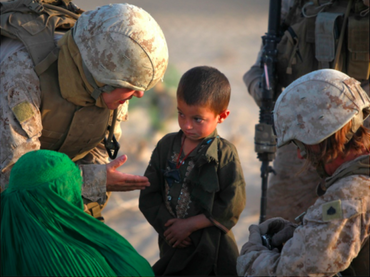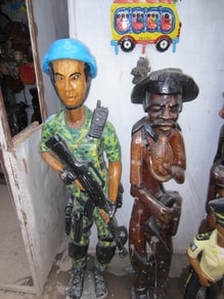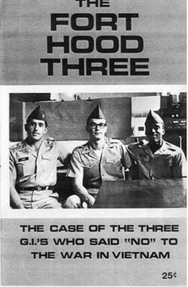
Through ethnographically and historically grounded research, I want to better understand the forces that animate permanent war toward the aim of building a less violent future. Specifically, I am concerned with the relationship between violence and humanitarianism. How is this relationship shaped through the politics of racial and gendered difference? I have pursued this agenda in several directions, with US imperialism as a through line stretching from the Iraq and Afghanistan Wars to UN intervention in Haiti. My first book, At War with Women: Military Humanitarianism and Imperial Feminism in an Era of Permanent War (Cornell University Press, 2023) examines the modern assembly of US imperialism through changes in gender and development politics during the post-9/11 wars. For this project, I conducted ethnographic observations of US military trainings during the Iraq and Afghanistan Wars. You can read more about the book here.
Extending the interventions of At War with Women, I am currently directing a large two-year study funded by the Carnegie Corporation that generates knowledge to reimagine a more peaceful US foreign policy. In close partnership with the Purdue Policy Research Institute, the Costs of War Project, Rethink Media, and multiple research partners at universities and within the nonprofit and social movement sector, this project seeks to better understand the taken-for-granted assumptions that fuel support for US foreign wars and militarization. Through multi-sited qualitative engagements in communities across the United States who are differentially positioned in relation to militarism, media analysis, and an original national public opinion poll, this project will provide information about US attitudes and beliefs about militarism, and the way US residents understand the relationship between domestic and foreign policy.

If my first book began with the question of what happens when the military adopts allegedly humanitarian rhetoric as a weapon of war, my second book project flips the script, asking how we might better understand humanitarian institutions and practices as formed through military violence. This builds on another dimension of my research focusing on security and humanitarian politics in Haiti. For over a decade I have worked on research projects ranging from contemporary peacekeeping to the first US occupation of Haiti from 1915 to 1935 to Haiti's role in US military knowledge production. My second book project emerges from this longstanding interest in the historical and geographical relationship of Haiti to the United States. Humanitarian politics in Haiti calls into question how humanitarianism is often understood as a reaction to violence, rather than as formed through it. My current research project, Humanitarian Insecurities: Haiti, International Organizations, and the Making of Disorder, is a response to this conceptual gap and its material stakes in Haiti. I ask how a continuum of military-police violence has shaped humanitarian institutions in Haiti. Humanitarian Insecurities unravels a tangle of securitized and humanitarian interventions. Conceptually, I draw on the the trove of Haitian feminist scholarship from La Ligue Féminine d'Action Sociale, Haiti's first formal feminist organization founded in the dynamic years following the first US occupation, to present-day scholar-activists contending with and redefining ensekirite in Haiti today, Concretely, this takes the form of asking how a securitized logic informs the way in which UN organizations decide to allocate humanitarian resources such as water or shelter. I am also conducting archival research on how the US Marines established a security apparatus in Haiti in the early twentieth century that informs how we might better understand security and insecurity today.

My other publications include an article in Development and Change that looks at how militarized development accelerated the trend of for-profit development contracting and an article on "military femininity" in Gender, Place and Culture. Based on a collaboration with Jordan T. Camp, I also worked on a research project about how racist constructions of the enemy worked to achieve consent to counterinsurgency at various turning points in U.S. imperial history from the development of small wars doctrine in the 1930s to renewal of counterinsurgency in the post-9/11 wars. You can read our article, "Counterinsurgency reexamined: racism, capitalism, and US military doctrine," in Antipode.
I am a contributor to the Costs of War project at Brown University, where I have written research papers directed at policy and media audiences on veterans, sexual violence, and gender inequality in the context of the post-9/11 wars. In an effort to provide a better understanding of Haiti beyond the headlines, I have written for outlets such as Responsible Statecraft, the Society for Cultural Anthropology’s Hot Spots Editor’s Forum, The Conversation, and Political Insight.
I am a contributor to the Costs of War project at Brown University, where I have written research papers directed at policy and media audiences on veterans, sexual violence, and gender inequality in the context of the post-9/11 wars. In an effort to provide a better understanding of Haiti beyond the headlines, I have written for outlets such as Responsible Statecraft, the Society for Cultural Anthropology’s Hot Spots Editor’s Forum, The Conversation, and Political Insight.